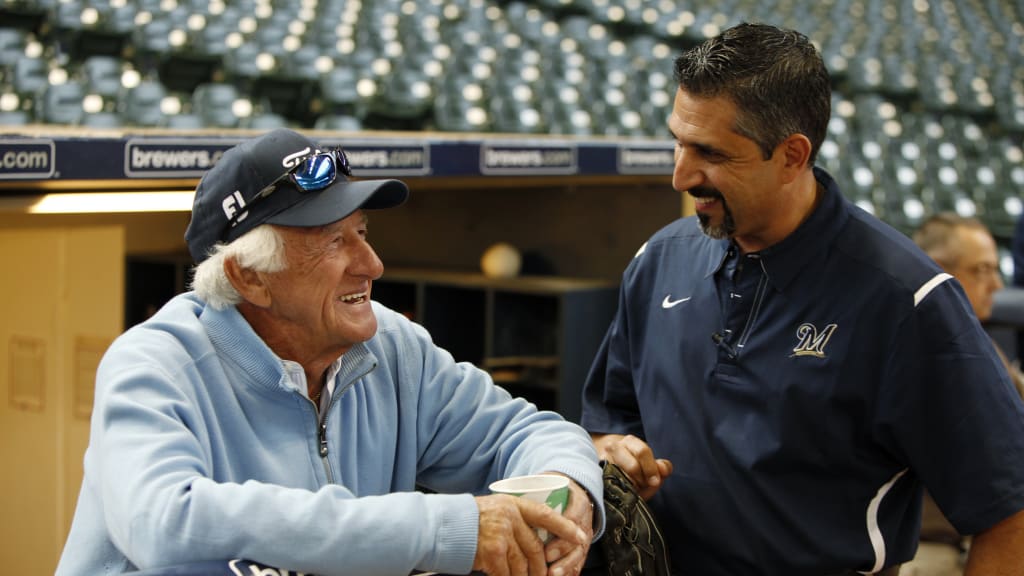PHOENIX -- Welcome to a day in the life of a Brewers player in 2021 Spring Training.
He wakes up, picks up his phone, opens an app and answers a series of health questions. Then he holds a team-provided thermometer to his temple and takes his temperature twice. If the result is 100.4 degrees Fahrenheit or lower, he gets a green boarding pass via the app and reports to ¡°The Barn¡± at American Family Fields of Phoenix, a climate-controlled workout space being used this spring for daily intake.
Every other day, he spits into a tube for PCR testing; the result comes the following afternoon. In the coming days, he will be given a Kinexon tracing device at intake, which is about the size of an Apple Watch and must be worn all day, including on the field. It will track with whom he spends time in close physical contact, in the event a positive test for COVID-19 requires contact tracing and quarantine.
The day is spent mostly outdoors. The Brewers pushed back their spring start times to avoid holding meetings in the cold. Players eat meals outside. They wear masks whenever possible. Work groups are smaller.
At the end of a long workday, each man returns to The Barn and checks out. Then, he heads home to rest and repeat.
No dining in restaurants. No indoor gatherings of more than 10 people. Fines if he breaks the rules.
Last year, the Brewers learned from MLB that they were one of two teams without a COVID-19 positive for a Tier 1 individual following intake testing. They are working as diligently as possible to ensure similar success during a 29-game Spring Training schedule and a 162-game season in 2021. Game No. 1 was Sunday afternoon against the White Sox.
The man in charge of this complicated, interconnected health effort is a pancreatic cancer survivor named Roger Caplinger.

Caplinger, 54, is beginning his 31st season with the Brewers. He started as an athletic trainer for the team¡¯s rookie-level Arizona League club and worked his way up the system, serving as the Brewers¡¯ Minor League medical coordinator from 1995-97, assistant athletic trainer for the Major League club from 1998-2001 and head athletic trainer from 2002-11. Since then, he has headed the Brewers¡¯ medical operation, including athletic training, strength and conditioning, rehabilitation services, sports science, psychological services and workers comp. His title is vice president of medical operations, health and safety.?
On Dec. 1, 2017, Caplinger had a knock on his front door at home. It was Dr. Mark Niedfeldt, a Brewers¡¯ team doctor and Caplinger¡¯s personal physician. He was holding a piece of paper bearing bad news. Caplinger had a malignant tumor on his pancreas.
¡°Looking on the internet and seeing a nine percent survival rate is not optimal,¡± Caplinger recalled.
Immediately, the caregiver found himself on the receiving end. Caplinger¡¯s wife, Jackie, lifted his spirits after the initial shock of the diagnosis and has been at Roger¡¯s side, with sons Kyle and Brett, ever since. Brewers principal owner Mark Attanasio and former team owner/former MLB Commissioner Bud Selig both told Caplinger, ¡°The jet is on the runway,¡± should he need transport for treatment. That very first day, Niedfeldt and Caplinger began researching pancreatic cancer specialists around the country.
They found the best care right at home. Dr. Doug Evans, chair of the department of surgery at the Medical College of Wisconsin, has pioneered groundbreaking treatments for pancreatic cancer. Evans has helped produce a 22 percent survival rate for the disease in Wisconsin, Caplinger said, compared to nine percent nationwide. As if a reminder of how close his care came to home, Caplinger could look out the window while undergoing chemotherapy and see the stadium.
He underwent 11 months of chemo and radiation, interrupted by a complex surgery called the ¡°Whipple procedure.¡± At a low moment soon after his diagnosis, Dr. Evans called Caplinger into a room and introduced him to another pancreatic cancer patient who had been in remission for five years, saying, ¡°I know you have a little doubt in your mind, but this is you.¡±
¡°From that day, that is what I believed,¡± Caplinger said. ¡°I believe I am going to have a five-year outcome, a 10-year outcome. I am going to do everything in my power to beat this.¡±
Caplinger began to tell his story in an effort to raise awareness for the fight against the disease. In 2019 he hosted The Purple Tie Guy event to raise funds for research and care. At every opportunity, he talks about local organizations working to serve cancer patients, like Kathy¡¯s House, a nonprofit that provides lodging for patients who travel to Milwaukee for medical care, and the Milwaukee chapter of the Pancreatic Cancer Action Network. When a woman from Scottsdale, Ariz. with pancreatic cancer heard his story, she contacted the Brewers in search of hope and began a regular correspondence with Caplinger, who assisted her search for a specialist. At last check, her tumor had shrunk by 96 percent.
On Oct. 15, 2019, Caplinger got his own good news. He finished chemotherapy and was cancer-free. He listened as Dr. Evans fulfilled a promise to utter aloud what Caplinger had been waiting to hear.
¡°You¡¯re cured.¡±

The patient has become the caregiver again.
Caplinger reported to 2020 Spring Training and followed developments as the coronavirus began to spread around the world. One day during the first week of that camp, he walked around the complex with a stack of pink sticky notes and marked doorways. The next day, there was a hand sanitizer dispenser in place of each note.
¡°His attention to detail is, like, maniacal,¡± said Brewers manager Craig Counsell, who played for the team during Caplinger¡¯s tenure as head athletic trainer. ¡°Details matter for Roger, which is an important thing in keeping you safe through this virus. The details matter here. You've got to do as much as you can, right, to give yourself and give the organization the best chance to be safe.¡±
Counsell credited Caplinger for setting the tone of the organizational effort to play safely through the pandemic. Counsell equated it to player performance; you cannot get comfortable or lose focus.
¡°Roger's been a friend for a long time,¡± Counsell said. ¡°He's just an incredible battler -- what he's fought through health-wise. The traits that I always tease Roger about are the traits that make him really good at what he's doing right now.
¡°You know, we couldn't have a better guy helping keep us safe, helping us manage the protocols is essentially his job and setting up the organization around it. He's made us safe and he's made us very organized in how we approach this, is the best way I can say it.¡±
Caplinger credits his team. It includes dozens of men and women from throughout the organization, including officials from human resources and legal, as well as the Major League and Minor League medical staffs. Last year, five of the Brewers¡¯ Minor League athletic trainers spent the summer in Milwaukee just to handle daily intake and testing for the Brewers and other teams coming through. When the Cardinals had a series of positive tests for COVID-19 that forced postponement of the Brewers¡¯ home-opening series, Caplinger assisted with the logistics of providing care. The Brewers learned lessons from that experience and others throughout the year, at the same time much was learned about the virus itself.
As front-line workers, Caplinger and the club¡¯s other medical staffers have all been vaccinated. Players must wait their turn, and while it will be each individual¡¯s choice, the club is working with Maricopa County in Arizona and Milwaukee County to be ready for when that time comes. Clubs will strongly encourage their players to get vaccinated.
Caplinger sees light at the end of the tunnel, but it is not here yet. He is thinking on one-month increments; get through Spring Training, then move the operation safety to Milwaukee and get through April, then May and so on.
¡°I have a sense of responsibility to this organization,¡± he said. ¡°It¡¯s going to be challenging. You can¡¯t let up.¡±
